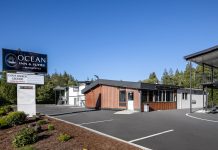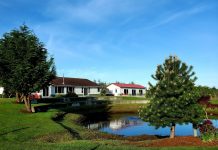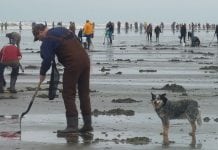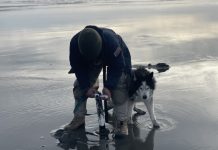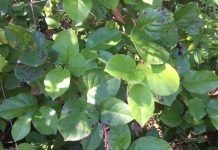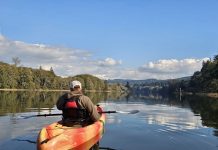This calendar is the place to find fun events happening throughout Grays Harbor County including Aberdeen, Hoquiam, Westport, Ocean Shores, Elma, Montesano and beyond.
Have an event that isn’t listed? Please email events@GraysHarborTalk.com with the following information:
- Name of Event
- Date, time and location (name of business if applicable and complete address)
- Organizer(s) name
- Cost
- URL to purchase tickets
- Website URL
- SHORT description of event
- Photo
Our editors will review and post within a few business days.
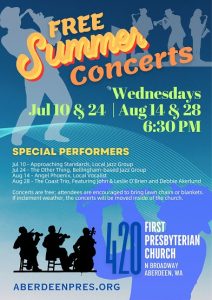
First Presbyterian Church of Aberdeen will hold four concerts this summer as part of our summer lawn concert series. The performances will be held Wednesday, July 10, July 24, August 14, and August 28 at 6:30 PM.
Performers for the series will include:
Jul 10 – Approaching Standards, Local Jazz Group
Jul 24 – The Other Thing, Bellingham-based Jazz Group
Aug 14 – Angel Phoenix, Local Vocalist
Aug 28 – The Coast Trio, Featuring John & Leslie O’Brien and Debbie Akerlund
Concerts are free; attendees are encouraged to bring lawn chairs or blankets. If inclement weather, the concerts will be moved inside of the church.
First Presbyterian Church of Aberdeen is located at 420 N Broadway, Aberdeen, WA 98520. For more info, go to our web site at www.aberdeenpres.org.

First Presbyterian Church of Aberdeen will hold four concerts this summer as part of our summer lawn concert series. The performances will be held Wednesday, July 10, July 24, August 14, and August 28 at 6:30 PM.
Performers for the series will include:
Jul 10 – Approaching Standards, Local Jazz Group
Jul 24 – The Other Thing, Bellingham-based Jazz Group
Aug 14 – Angel Phoenix, Local Vocalist
Aug 28 – The Coast Trio, Featuring John & Leslie O’Brien and Debbie Akerlund
Concerts are free; attendees are encouraged to bring lawn chairs or blankets. If inclement weather, the concerts will be moved inside of the church.
First Presbyterian Church of Aberdeen is located at 420 N Broadway, Aberdeen, WA 98520. For more info, go to our web site at www.aberdeenpres.org.

First Presbyterian Church of Aberdeen will hold four concerts this summer as part of our summer lawn concert series. The performances will be held Wednesday, July 10, July 24, August 14, and August 28 at 6:30 PM.
Performers for the series will include:
Jul 10 – Approaching Standards, Local Jazz Group
Jul 24 – The Other Thing, Bellingham-based Jazz Group
Aug 14 – Angel Phoenix, Local Vocalist
Aug 28 – The Coast Trio, Featuring John & Leslie O’Brien and Debbie Akerlund
Concerts are free; attendees are encouraged to bring lawn chairs or blankets. If inclement weather, the concerts will be moved inside of the church.
First Presbyterian Church of Aberdeen is located at 420 N Broadway, Aberdeen, WA 98520. For more info, go to our web site at www.aberdeenpres.org.
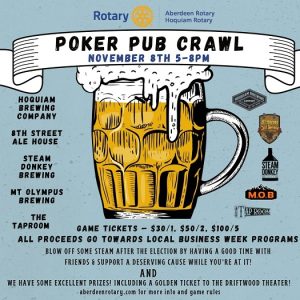
Join Us for the Rotary Club Charity Pub Crawl!? Drink, Laugh, and Give Back! ?
Grab your friends, raise a glass, and support a great cause at our annual Rotary Pub Crawl for Charity! All proceeds go towards Local Business Week programs, helping make a difference in our community.
? Start Location: You can begin at any of the participating pubs. The lineup of participating pubs include: Hoquiam Brewing Company, 8th Street Ale House, Steam Donkey Brewing, Mt. Olympus Brewing and The Tap Room.
What to Expect:
As you roam from pub to pub you will have a chance to connect with fellow community members and Rotary supporters. Bring your office group, friends and family. You will have a great time, knowing every sip you take is helping a great cause!
We have some excellent prizes including a Golden Ticket at the Driftwood Theater!
?? Tickets:
Ticket prices (your poker cards) are $30 for1, $50 for 2 and $100 for 5
Purchase tickets at any of the participating pubs the night of the event.
We will also have a QR code on the https://www.aberdeenrotary.com web site
Limited spots available!
Let’s drink for a difference and make this an unforgettable night!
The Olympia Women’s Jazz Choir will be bringing their holiday spirit as they share seasonal favorites under the direction of Jessica Blinn
November 19, 2024, Hoquiam, WA – Public Health is proud to announce the premiere of the 28-minute documentary, “Voices of Resilience,” which shines a powerful light on the issues of housing, homelessness, and the human experiences that inspire hope, recovery, and transformation.
Inspired by an outreach event in Fall 2022, Voices of Resilience shares the deeply moving stories of individuals who have experienced homelessness but have since found stable housing, sobriety, and a renewed sense of community. The documentary also features interviews with service providers who work tirelessly alongside these individuals, helping to support them in their journey of healing and growth.
Audience feedback from various community groups—including business owners, service providers, government representatives from the WA Department of Health (DOH) and Department of Commerce, as well as individuals featured in the film—has been overwhelmingly positive. Viewers have described the documentary as an uplifting and much-needed message of hope, particularly during the holiday season. The film underscores the successful elements that contribute to lasting, transformative change, offering a hopeful vision for addressing homelessness in our community.
We are excited to invite you to the Grand Premiere Screening of the documentary, “Voices of Resilience!”
Join us on Thursday, December 5th, 2024, for an inspiring evening at the 7th Street Theatre in Hoquiam. The screening will begin at 6:30 p.m. and will be followed by a Q&A session with the documentary’s cast, including individuals featured in the film, service providers, law enforcement officers, and Public Health staff.
This is a unique opportunity to engage with those who have firsthand experience and those working on the frontlines to create meaningful change in our community. The event promises to be both informative and inspiring, offering a chance to connect with others who share the goal of making a difference in the lives of those affected by homelessness.
- Admission: FREE! (Popcorn is on us!)
- RSVP: RSVP is not required, but it is recommended through the following link:
https://voicesofresilience.splashthat.com
Important Note from Theatre Management: To ensure the preservation of the historic theatre, please note the following:
- Only bottled drinks (soda or water) are allowed in the auditorium. No cans or open cups.
- Sticky foods such as cotton candy, candied popcorn, or similar items are prohibited.
This event is a unique opportunity to be part of an important conversation about homelessness, resilience, and the transformative power of community support. We are grateful to everyone who contributed to this project, especially Rick Moyer of Moyer Multimedia, whose expertise made this documentary truly special.
We look forward to seeing you at this impactful event. Together, we can continue to build a more compassionate, supportive, and resilient community.
WDFW approves seven days of coastal razor clam digs starting Jan. 10; more digs planned through March 1
Washington Department of Fish and Wildlife (WDFW) shellfish managers confirmed seven days of razor clam digs on coastal beaches beginning Jan. 10.
“This upcoming tide series should be a good one for daylight digging opportunity, with weekend low tide times occurring before or just after sunset,” said Bryce Blumenthal, WDFW’s recreational razor clam manager. “Clam diggers have had mixed success with recent weather, but we expect improved conditions — and easier digging — as winter approaches spring.”
Not all coastal beaches are open for every dig, so diggers are encouraged to make sure their intended destination is open before heading out. No digging is allowed before noon during digs when low tide occurs in the afternoon or evening. Most successful digging occurs between one and two hours before the listed time of low tide.
The following digs during evening (p.m.) low tides will proceed as scheduled, after marine toxin results from the Washington State Department of Health (DOH) showed razor clams are safe to eat:
- Jan 10, Friday, 3:47 p.m.; -0.3 feet; Long Beach, Twin Harbors, Mocrocks
- Jan 11, Saturday, 4:39 p.m.; -0.8 feet; Long Beach, Twin Harbors, Mocrocks
- Jan 12, Sunday, 5:27 p.m.; -1.0 feet; Long Beach, Twin Harbors, Copalis
- Jan 13, Monday, 6:10 p.m.; -1.1 feet; Long Beach, Twin Harbors, Copalis
- Jan 14, Tuesday, 6:50 p.m.; -0.9 feet; Long Beach, Twin Harbors, Mocrocks
- Jan 15, Wednesday, 7:28 p.m.; -0.6 feet; Long Beach, Twin Harbors, Mocrocks
- Jan 16, Thursday, 8:03 p.m.; -0.2 feet; Long Beach, Twin Harbors, Copalis
Below are additional tentative dates:
- Jan 26, Sunday, 4:34 p.m.; 0.1 feet; Long Beach, Twin Harbors, Mocrocks
- Jan 27, Monday, 5:15 p.m.; -0.4 feet; Long Beach, Twin Harbors, Mocrocks
- Jan 28, Tuesday, 5:54 p.m.; -0.8 feet; Long Beach, Twin Harbors, Copalis
- Jan 29, Wednesday, 6:31 p.m.; -1.0 feet; Long Beach, Twin Harbors, Copalis
- Jan 30, Thursday, 7:07 p.m.; -1.0 feet; Long Beach, Twin Harbors, Mocrocks
- Jan 31, Friday, 7:44 p.m.; -0.7 feet; Long Beach, Twin Harbors, Mocrocks
- Feb 1, Saturday, 8:21 p.m.; -0.1 feet; Long Beach, Twin Harbors, Copalis
- Feb 8, Saturday, 3:36 p.m.; 0.1 feet; Long Beach, Twin Harbors, Mocrocks
- Feb 9, Sunday, 4:29 p.m.; -0.3 feet; Long Beach, Twin Harbors, Copalis
- Feb 10, Monday, 5:15 p.m.; -0.5 feet; Long Beach, Twin Harbors, Copalis
- Feb 11, Tuesday, 5:54 p.m.; -0.5 feet; Long Beach, Twin Harbors, Mocrocks
- Feb 12, Wednesday, 6:29 p.m.; -0.4 feet; Long Beach, Twin Harbors, Mocrocks
- Feb 13, Thursday, 7:01 p.m.; -0.1 feet; Long Beach, Twin Harbors, Copalis
- Feb 14, Friday, 7:32 p.m.; 0.4 feet; Long Beach, Twin Harbors, Copalis
- Feb 24, Monday, 4:04 p.m.; 0.2 feet; Long Beach, Twin Harbors, Mocrocks
- Feb 25, Tuesday, 4:46 p.m.; -0.3 feet; Long Beach, Twin Harbors, Copalis
- Feb 26, Wednesday, 5:25 p.m.; -0.6 feet; Long Beach, Twin Harbors, Copalis
- Feb 27, Thursday, 6:03 p.m.; -0.7 feet; Long Beach, Twin Harbors, Mocrocks
- Feb 28, Friday, 6:39 p.m.; -0.6 feet; Long Beach, Twin Harbors, Mocrocks
- March 1, Saturday, 7:15 p.m.; -0.1 feet; Long Beach, Twin Harbors, Copalis
DOH requires test samples for marine toxins, and domoic acid levels must fall under the guideline level before a beach can open for digging. Domoic acid, a natural toxin produced by certain types of marine algae, can be harmful or fatal if consumed in sufficient quantities. Final approval usually occurs about a week or less before the start of each digging series. More information about domoic acid, as well as current levels at ocean beaches, can be found on WDFW’s domoic acid webpage.
On all open beaches, the daily limit is 15 clams per person. Each digger’s clams must be kept in a separate container, and all diggers must keep the first 15 clams they dig, regardless of size or condition, to prevent waste.
All diggers 15 or older must have an applicable fishing license to harvest razor clams on any beach. Licenses can be purchased from WDFW’s licensing website and from hundreds of license vendors around the state. WDFW recommends buying your license before visiting coastal beach communities.
The 2024-25 Razor Clam Management Plan is available on WDFW’s website. For more information, refer to WDFW’s razor clam webpage.
The Washington Department of Fish and Wildlife works to preserve, protect, and perpetuate fish, wildlife and ecosystems while providing sustainable fish and wildlife recreational and commercial opportunities.
WDFW approves seven days of coastal razor clam digs starting Jan. 10; more digs planned through March 1
Washington Department of Fish and Wildlife (WDFW) shellfish managers confirmed seven days of razor clam digs on coastal beaches beginning Jan. 10.
“This upcoming tide series should be a good one for daylight digging opportunity, with weekend low tide times occurring before or just after sunset,” said Bryce Blumenthal, WDFW’s recreational razor clam manager. “Clam diggers have had mixed success with recent weather, but we expect improved conditions — and easier digging — as winter approaches spring.”
Not all coastal beaches are open for every dig, so diggers are encouraged to make sure their intended destination is open before heading out. No digging is allowed before noon during digs when low tide occurs in the afternoon or evening. Most successful digging occurs between one and two hours before the listed time of low tide.
The following digs during evening (p.m.) low tides will proceed as scheduled, after marine toxin results from the Washington State Department of Health (DOH) showed razor clams are safe to eat:
- Jan 10, Friday, 3:47 p.m.; -0.3 feet; Long Beach, Twin Harbors, Mocrocks
- Jan 11, Saturday, 4:39 p.m.; -0.8 feet; Long Beach, Twin Harbors, Mocrocks
- Jan 12, Sunday, 5:27 p.m.; -1.0 feet; Long Beach, Twin Harbors, Copalis
- Jan 13, Monday, 6:10 p.m.; -1.1 feet; Long Beach, Twin Harbors, Copalis
- Jan 14, Tuesday, 6:50 p.m.; -0.9 feet; Long Beach, Twin Harbors, Mocrocks
- Jan 15, Wednesday, 7:28 p.m.; -0.6 feet; Long Beach, Twin Harbors, Mocrocks
- Jan 16, Thursday, 8:03 p.m.; -0.2 feet; Long Beach, Twin Harbors, Copalis
Below are additional tentative dates:
- Jan 26, Sunday, 4:34 p.m.; 0.1 feet; Long Beach, Twin Harbors, Mocrocks
- Jan 27, Monday, 5:15 p.m.; -0.4 feet; Long Beach, Twin Harbors, Mocrocks
- Jan 28, Tuesday, 5:54 p.m.; -0.8 feet; Long Beach, Twin Harbors, Copalis
- Jan 29, Wednesday, 6:31 p.m.; -1.0 feet; Long Beach, Twin Harbors, Copalis
- Jan 30, Thursday, 7:07 p.m.; -1.0 feet; Long Beach, Twin Harbors, Mocrocks
- Jan 31, Friday, 7:44 p.m.; -0.7 feet; Long Beach, Twin Harbors, Mocrocks
- Feb 1, Saturday, 8:21 p.m.; -0.1 feet; Long Beach, Twin Harbors, Copalis
- Feb 8, Saturday, 3:36 p.m.; 0.1 feet; Long Beach, Twin Harbors, Mocrocks
- Feb 9, Sunday, 4:29 p.m.; -0.3 feet; Long Beach, Twin Harbors, Copalis
- Feb 10, Monday, 5:15 p.m.; -0.5 feet; Long Beach, Twin Harbors, Copalis
- Feb 11, Tuesday, 5:54 p.m.; -0.5 feet; Long Beach, Twin Harbors, Mocrocks
- Feb 12, Wednesday, 6:29 p.m.; -0.4 feet; Long Beach, Twin Harbors, Mocrocks
- Feb 13, Thursday, 7:01 p.m.; -0.1 feet; Long Beach, Twin Harbors, Copalis
- Feb 14, Friday, 7:32 p.m.; 0.4 feet; Long Beach, Twin Harbors, Copalis
- Feb 24, Monday, 4:04 p.m.; 0.2 feet; Long Beach, Twin Harbors, Mocrocks
- Feb 25, Tuesday, 4:46 p.m.; -0.3 feet; Long Beach, Twin Harbors, Copalis
- Feb 26, Wednesday, 5:25 p.m.; -0.6 feet; Long Beach, Twin Harbors, Copalis
- Feb 27, Thursday, 6:03 p.m.; -0.7 feet; Long Beach, Twin Harbors, Mocrocks
- Feb 28, Friday, 6:39 p.m.; -0.6 feet; Long Beach, Twin Harbors, Mocrocks
- March 1, Saturday, 7:15 p.m.; -0.1 feet; Long Beach, Twin Harbors, Copalis
DOH requires test samples for marine toxins, and domoic acid levels must fall under the guideline level before a beach can open for digging. Domoic acid, a natural toxin produced by certain types of marine algae, can be harmful or fatal if consumed in sufficient quantities. Final approval usually occurs about a week or less before the start of each digging series. More information about domoic acid, as well as current levels at ocean beaches, can be found on WDFW’s domoic acid webpage.
On all open beaches, the daily limit is 15 clams per person. Each digger’s clams must be kept in a separate container, and all diggers must keep the first 15 clams they dig, regardless of size or condition, to prevent waste.
All diggers 15 or older must have an applicable fishing license to harvest razor clams on any beach. Licenses can be purchased from WDFW’s licensing website and from hundreds of license vendors around the state. WDFW recommends buying your license before visiting coastal beach communities.
The 2024-25 Razor Clam Management Plan is available on WDFW’s website. For more information, refer to WDFW’s razor clam webpage.
The Washington Department of Fish and Wildlife works to preserve, protect, and perpetuate fish, wildlife and ecosystems while providing sustainable fish and wildlife recreational and commercial opportunities.
WDFW approves seven days of coastal razor clam digs starting Jan. 10; more digs planned through March 1
Washington Department of Fish and Wildlife (WDFW) shellfish managers confirmed seven days of razor clam digs on coastal beaches beginning Jan. 10.
“This upcoming tide series should be a good one for daylight digging opportunity, with weekend low tide times occurring before or just after sunset,” said Bryce Blumenthal, WDFW’s recreational razor clam manager. “Clam diggers have had mixed success with recent weather, but we expect improved conditions — and easier digging — as winter approaches spring.”
Not all coastal beaches are open for every dig, so diggers are encouraged to make sure their intended destination is open before heading out. No digging is allowed before noon during digs when low tide occurs in the afternoon or evening. Most successful digging occurs between one and two hours before the listed time of low tide.
The following digs during evening (p.m.) low tides will proceed as scheduled, after marine toxin results from the Washington State Department of Health (DOH) showed razor clams are safe to eat:
- Jan 10, Friday, 3:47 p.m.; -0.3 feet; Long Beach, Twin Harbors, Mocrocks
- Jan 11, Saturday, 4:39 p.m.; -0.8 feet; Long Beach, Twin Harbors, Mocrocks
- Jan 12, Sunday, 5:27 p.m.; -1.0 feet; Long Beach, Twin Harbors, Copalis
- Jan 13, Monday, 6:10 p.m.; -1.1 feet; Long Beach, Twin Harbors, Copalis
- Jan 14, Tuesday, 6:50 p.m.; -0.9 feet; Long Beach, Twin Harbors, Mocrocks
- Jan 15, Wednesday, 7:28 p.m.; -0.6 feet; Long Beach, Twin Harbors, Mocrocks
- Jan 16, Thursday, 8:03 p.m.; -0.2 feet; Long Beach, Twin Harbors, Copalis
Below are additional tentative dates:
- Jan 26, Sunday, 4:34 p.m.; 0.1 feet; Long Beach, Twin Harbors, Mocrocks
- Jan 27, Monday, 5:15 p.m.; -0.4 feet; Long Beach, Twin Harbors, Mocrocks
- Jan 28, Tuesday, 5:54 p.m.; -0.8 feet; Long Beach, Twin Harbors, Copalis
- Jan 29, Wednesday, 6:31 p.m.; -1.0 feet; Long Beach, Twin Harbors, Copalis
- Jan 30, Thursday, 7:07 p.m.; -1.0 feet; Long Beach, Twin Harbors, Mocrocks
- Jan 31, Friday, 7:44 p.m.; -0.7 feet; Long Beach, Twin Harbors, Mocrocks
- Feb 1, Saturday, 8:21 p.m.; -0.1 feet; Long Beach, Twin Harbors, Copalis
- Feb 8, Saturday, 3:36 p.m.; 0.1 feet; Long Beach, Twin Harbors, Mocrocks
- Feb 9, Sunday, 4:29 p.m.; -0.3 feet; Long Beach, Twin Harbors, Copalis
- Feb 10, Monday, 5:15 p.m.; -0.5 feet; Long Beach, Twin Harbors, Copalis
- Feb 11, Tuesday, 5:54 p.m.; -0.5 feet; Long Beach, Twin Harbors, Mocrocks
- Feb 12, Wednesday, 6:29 p.m.; -0.4 feet; Long Beach, Twin Harbors, Mocrocks
- Feb 13, Thursday, 7:01 p.m.; -0.1 feet; Long Beach, Twin Harbors, Copalis
- Feb 14, Friday, 7:32 p.m.; 0.4 feet; Long Beach, Twin Harbors, Copalis
- Feb 24, Monday, 4:04 p.m.; 0.2 feet; Long Beach, Twin Harbors, Mocrocks
- Feb 25, Tuesday, 4:46 p.m.; -0.3 feet; Long Beach, Twin Harbors, Copalis
- Feb 26, Wednesday, 5:25 p.m.; -0.6 feet; Long Beach, Twin Harbors, Copalis
- Feb 27, Thursday, 6:03 p.m.; -0.7 feet; Long Beach, Twin Harbors, Mocrocks
- Feb 28, Friday, 6:39 p.m.; -0.6 feet; Long Beach, Twin Harbors, Mocrocks
- March 1, Saturday, 7:15 p.m.; -0.1 feet; Long Beach, Twin Harbors, Copalis
DOH requires test samples for marine toxins, and domoic acid levels must fall under the guideline level before a beach can open for digging. Domoic acid, a natural toxin produced by certain types of marine algae, can be harmful or fatal if consumed in sufficient quantities. Final approval usually occurs about a week or less before the start of each digging series. More information about domoic acid, as well as current levels at ocean beaches, can be found on WDFW’s domoic acid webpage.
On all open beaches, the daily limit is 15 clams per person. Each digger’s clams must be kept in a separate container, and all diggers must keep the first 15 clams they dig, regardless of size or condition, to prevent waste.
All diggers 15 or older must have an applicable fishing license to harvest razor clams on any beach. Licenses can be purchased from WDFW’s licensing website and from hundreds of license vendors around the state. WDFW recommends buying your license before visiting coastal beach communities.
The 2024-25 Razor Clam Management Plan is available on WDFW’s website. For more information, refer to WDFW’s razor clam webpage.
The Washington Department of Fish and Wildlife works to preserve, protect, and perpetuate fish, wildlife and ecosystems while providing sustainable fish and wildlife recreational and commercial opportunities.
WDFW approves seven days of coastal razor clam digs starting Jan. 10; more digs planned through March 1
Washington Department of Fish and Wildlife (WDFW) shellfish managers confirmed seven days of razor clam digs on coastal beaches beginning Jan. 10.
“This upcoming tide series should be a good one for daylight digging opportunity, with weekend low tide times occurring before or just after sunset,” said Bryce Blumenthal, WDFW’s recreational razor clam manager. “Clam diggers have had mixed success with recent weather, but we expect improved conditions — and easier digging — as winter approaches spring.”
Not all coastal beaches are open for every dig, so diggers are encouraged to make sure their intended destination is open before heading out. No digging is allowed before noon during digs when low tide occurs in the afternoon or evening. Most successful digging occurs between one and two hours before the listed time of low tide.
The following digs during evening (p.m.) low tides will proceed as scheduled, after marine toxin results from the Washington State Department of Health (DOH) showed razor clams are safe to eat:
- Jan 10, Friday, 3:47 p.m.; -0.3 feet; Long Beach, Twin Harbors, Mocrocks
- Jan 11, Saturday, 4:39 p.m.; -0.8 feet; Long Beach, Twin Harbors, Mocrocks
- Jan 12, Sunday, 5:27 p.m.; -1.0 feet; Long Beach, Twin Harbors, Copalis
- Jan 13, Monday, 6:10 p.m.; -1.1 feet; Long Beach, Twin Harbors, Copalis
- Jan 14, Tuesday, 6:50 p.m.; -0.9 feet; Long Beach, Twin Harbors, Mocrocks
- Jan 15, Wednesday, 7:28 p.m.; -0.6 feet; Long Beach, Twin Harbors, Mocrocks
- Jan 16, Thursday, 8:03 p.m.; -0.2 feet; Long Beach, Twin Harbors, Copalis
Below are additional tentative dates:
- Jan 26, Sunday, 4:34 p.m.; 0.1 feet; Long Beach, Twin Harbors, Mocrocks
- Jan 27, Monday, 5:15 p.m.; -0.4 feet; Long Beach, Twin Harbors, Mocrocks
- Jan 28, Tuesday, 5:54 p.m.; -0.8 feet; Long Beach, Twin Harbors, Copalis
- Jan 29, Wednesday, 6:31 p.m.; -1.0 feet; Long Beach, Twin Harbors, Copalis
- Jan 30, Thursday, 7:07 p.m.; -1.0 feet; Long Beach, Twin Harbors, Mocrocks
- Jan 31, Friday, 7:44 p.m.; -0.7 feet; Long Beach, Twin Harbors, Mocrocks
- Feb 1, Saturday, 8:21 p.m.; -0.1 feet; Long Beach, Twin Harbors, Copalis
- Feb 8, Saturday, 3:36 p.m.; 0.1 feet; Long Beach, Twin Harbors, Mocrocks
- Feb 9, Sunday, 4:29 p.m.; -0.3 feet; Long Beach, Twin Harbors, Copalis
- Feb 10, Monday, 5:15 p.m.; -0.5 feet; Long Beach, Twin Harbors, Copalis
- Feb 11, Tuesday, 5:54 p.m.; -0.5 feet; Long Beach, Twin Harbors, Mocrocks
- Feb 12, Wednesday, 6:29 p.m.; -0.4 feet; Long Beach, Twin Harbors, Mocrocks
- Feb 13, Thursday, 7:01 p.m.; -0.1 feet; Long Beach, Twin Harbors, Copalis
- Feb 14, Friday, 7:32 p.m.; 0.4 feet; Long Beach, Twin Harbors, Copalis
- Feb 24, Monday, 4:04 p.m.; 0.2 feet; Long Beach, Twin Harbors, Mocrocks
- Feb 25, Tuesday, 4:46 p.m.; -0.3 feet; Long Beach, Twin Harbors, Copalis
- Feb 26, Wednesday, 5:25 p.m.; -0.6 feet; Long Beach, Twin Harbors, Copalis
- Feb 27, Thursday, 6:03 p.m.; -0.7 feet; Long Beach, Twin Harbors, Mocrocks
- Feb 28, Friday, 6:39 p.m.; -0.6 feet; Long Beach, Twin Harbors, Mocrocks
- March 1, Saturday, 7:15 p.m.; -0.1 feet; Long Beach, Twin Harbors, Copalis
DOH requires test samples for marine toxins, and domoic acid levels must fall under the guideline level before a beach can open for digging. Domoic acid, a natural toxin produced by certain types of marine algae, can be harmful or fatal if consumed in sufficient quantities. Final approval usually occurs about a week or less before the start of each digging series. More information about domoic acid, as well as current levels at ocean beaches, can be found on WDFW’s domoic acid webpage.
On all open beaches, the daily limit is 15 clams per person. Each digger’s clams must be kept in a separate container, and all diggers must keep the first 15 clams they dig, regardless of size or condition, to prevent waste.
All diggers 15 or older must have an applicable fishing license to harvest razor clams on any beach. Licenses can be purchased from WDFW’s licensing website and from hundreds of license vendors around the state. WDFW recommends buying your license before visiting coastal beach communities.
The 2024-25 Razor Clam Management Plan is available on WDFW’s website. For more information, refer to WDFW’s razor clam webpage.
The Washington Department of Fish and Wildlife works to preserve, protect, and perpetuate fish, wildlife and ecosystems while providing sustainable fish and wildlife recreational and commercial opportunities.
WDFW approves seven days of coastal razor clam digs starting Jan. 10; more digs planned through March 1
Washington Department of Fish and Wildlife (WDFW) shellfish managers confirmed seven days of razor clam digs on coastal beaches beginning Jan. 10.
“This upcoming tide series should be a good one for daylight digging opportunity, with weekend low tide times occurring before or just after sunset,” said Bryce Blumenthal, WDFW’s recreational razor clam manager. “Clam diggers have had mixed success with recent weather, but we expect improved conditions — and easier digging — as winter approaches spring.”
Not all coastal beaches are open for every dig, so diggers are encouraged to make sure their intended destination is open before heading out. No digging is allowed before noon during digs when low tide occurs in the afternoon or evening. Most successful digging occurs between one and two hours before the listed time of low tide.
The following digs during evening (p.m.) low tides will proceed as scheduled, after marine toxin results from the Washington State Department of Health (DOH) showed razor clams are safe to eat:
- Jan 10, Friday, 3:47 p.m.; -0.3 feet; Long Beach, Twin Harbors, Mocrocks
- Jan 11, Saturday, 4:39 p.m.; -0.8 feet; Long Beach, Twin Harbors, Mocrocks
- Jan 12, Sunday, 5:27 p.m.; -1.0 feet; Long Beach, Twin Harbors, Copalis
- Jan 13, Monday, 6:10 p.m.; -1.1 feet; Long Beach, Twin Harbors, Copalis
- Jan 14, Tuesday, 6:50 p.m.; -0.9 feet; Long Beach, Twin Harbors, Mocrocks
- Jan 15, Wednesday, 7:28 p.m.; -0.6 feet; Long Beach, Twin Harbors, Mocrocks
- Jan 16, Thursday, 8:03 p.m.; -0.2 feet; Long Beach, Twin Harbors, Copalis
Below are additional tentative dates:
- Jan 26, Sunday, 4:34 p.m.; 0.1 feet; Long Beach, Twin Harbors, Mocrocks
- Jan 27, Monday, 5:15 p.m.; -0.4 feet; Long Beach, Twin Harbors, Mocrocks
- Jan 28, Tuesday, 5:54 p.m.; -0.8 feet; Long Beach, Twin Harbors, Copalis
- Jan 29, Wednesday, 6:31 p.m.; -1.0 feet; Long Beach, Twin Harbors, Copalis
- Jan 30, Thursday, 7:07 p.m.; -1.0 feet; Long Beach, Twin Harbors, Mocrocks
- Jan 31, Friday, 7:44 p.m.; -0.7 feet; Long Beach, Twin Harbors, Mocrocks
- Feb 1, Saturday, 8:21 p.m.; -0.1 feet; Long Beach, Twin Harbors, Copalis
- Feb 8, Saturday, 3:36 p.m.; 0.1 feet; Long Beach, Twin Harbors, Mocrocks
- Feb 9, Sunday, 4:29 p.m.; -0.3 feet; Long Beach, Twin Harbors, Copalis
- Feb 10, Monday, 5:15 p.m.; -0.5 feet; Long Beach, Twin Harbors, Copalis
- Feb 11, Tuesday, 5:54 p.m.; -0.5 feet; Long Beach, Twin Harbors, Mocrocks
- Feb 12, Wednesday, 6:29 p.m.; -0.4 feet; Long Beach, Twin Harbors, Mocrocks
- Feb 13, Thursday, 7:01 p.m.; -0.1 feet; Long Beach, Twin Harbors, Copalis
- Feb 14, Friday, 7:32 p.m.; 0.4 feet; Long Beach, Twin Harbors, Copalis
- Feb 24, Monday, 4:04 p.m.; 0.2 feet; Long Beach, Twin Harbors, Mocrocks
- Feb 25, Tuesday, 4:46 p.m.; -0.3 feet; Long Beach, Twin Harbors, Copalis
- Feb 26, Wednesday, 5:25 p.m.; -0.6 feet; Long Beach, Twin Harbors, Copalis
- Feb 27, Thursday, 6:03 p.m.; -0.7 feet; Long Beach, Twin Harbors, Mocrocks
- Feb 28, Friday, 6:39 p.m.; -0.6 feet; Long Beach, Twin Harbors, Mocrocks
- March 1, Saturday, 7:15 p.m.; -0.1 feet; Long Beach, Twin Harbors, Copalis
DOH requires test samples for marine toxins, and domoic acid levels must fall under the guideline level before a beach can open for digging. Domoic acid, a natural toxin produced by certain types of marine algae, can be harmful or fatal if consumed in sufficient quantities. Final approval usually occurs about a week or less before the start of each digging series. More information about domoic acid, as well as current levels at ocean beaches, can be found on WDFW’s domoic acid webpage.
On all open beaches, the daily limit is 15 clams per person. Each digger’s clams must be kept in a separate container, and all diggers must keep the first 15 clams they dig, regardless of size or condition, to prevent waste.
All diggers 15 or older must have an applicable fishing license to harvest razor clams on any beach. Licenses can be purchased from WDFW’s licensing website and from hundreds of license vendors around the state. WDFW recommends buying your license before visiting coastal beach communities.
The 2024-25 Razor Clam Management Plan is available on WDFW’s website. For more information, refer to WDFW’s razor clam webpage.
The Washington Department of Fish and Wildlife works to preserve, protect, and perpetuate fish, wildlife and ecosystems while providing sustainable fish and wildlife recreational and commercial opportunities.
WDFW approves seven days of coastal razor clam digs starting Jan. 10; more digs planned through March 1
Washington Department of Fish and Wildlife (WDFW) shellfish managers confirmed seven days of razor clam digs on coastal beaches beginning Jan. 10.
“This upcoming tide series should be a good one for daylight digging opportunity, with weekend low tide times occurring before or just after sunset,” said Bryce Blumenthal, WDFW’s recreational razor clam manager. “Clam diggers have had mixed success with recent weather, but we expect improved conditions — and easier digging — as winter approaches spring.”
Not all coastal beaches are open for every dig, so diggers are encouraged to make sure their intended destination is open before heading out. No digging is allowed before noon during digs when low tide occurs in the afternoon or evening. Most successful digging occurs between one and two hours before the listed time of low tide.
The following digs during evening (p.m.) low tides will proceed as scheduled, after marine toxin results from the Washington State Department of Health (DOH) showed razor clams are safe to eat:
- Jan 10, Friday, 3:47 p.m.; -0.3 feet; Long Beach, Twin Harbors, Mocrocks
- Jan 11, Saturday, 4:39 p.m.; -0.8 feet; Long Beach, Twin Harbors, Mocrocks
- Jan 12, Sunday, 5:27 p.m.; -1.0 feet; Long Beach, Twin Harbors, Copalis
- Jan 13, Monday, 6:10 p.m.; -1.1 feet; Long Beach, Twin Harbors, Copalis
- Jan 14, Tuesday, 6:50 p.m.; -0.9 feet; Long Beach, Twin Harbors, Mocrocks
- Jan 15, Wednesday, 7:28 p.m.; -0.6 feet; Long Beach, Twin Harbors, Mocrocks
- Jan 16, Thursday, 8:03 p.m.; -0.2 feet; Long Beach, Twin Harbors, Copalis
Below are additional tentative dates:
- Jan 26, Sunday, 4:34 p.m.; 0.1 feet; Long Beach, Twin Harbors, Mocrocks
- Jan 27, Monday, 5:15 p.m.; -0.4 feet; Long Beach, Twin Harbors, Mocrocks
- Jan 28, Tuesday, 5:54 p.m.; -0.8 feet; Long Beach, Twin Harbors, Copalis
- Jan 29, Wednesday, 6:31 p.m.; -1.0 feet; Long Beach, Twin Harbors, Copalis
- Jan 30, Thursday, 7:07 p.m.; -1.0 feet; Long Beach, Twin Harbors, Mocrocks
- Jan 31, Friday, 7:44 p.m.; -0.7 feet; Long Beach, Twin Harbors, Mocrocks
- Feb 1, Saturday, 8:21 p.m.; -0.1 feet; Long Beach, Twin Harbors, Copalis
- Feb 8, Saturday, 3:36 p.m.; 0.1 feet; Long Beach, Twin Harbors, Mocrocks
- Feb 9, Sunday, 4:29 p.m.; -0.3 feet; Long Beach, Twin Harbors, Copalis
- Feb 10, Monday, 5:15 p.m.; -0.5 feet; Long Beach, Twin Harbors, Copalis
- Feb 11, Tuesday, 5:54 p.m.; -0.5 feet; Long Beach, Twin Harbors, Mocrocks
- Feb 12, Wednesday, 6:29 p.m.; -0.4 feet; Long Beach, Twin Harbors, Mocrocks
- Feb 13, Thursday, 7:01 p.m.; -0.1 feet; Long Beach, Twin Harbors, Copalis
- Feb 14, Friday, 7:32 p.m.; 0.4 feet; Long Beach, Twin Harbors, Copalis
- Feb 24, Monday, 4:04 p.m.; 0.2 feet; Long Beach, Twin Harbors, Mocrocks
- Feb 25, Tuesday, 4:46 p.m.; -0.3 feet; Long Beach, Twin Harbors, Copalis
- Feb 26, Wednesday, 5:25 p.m.; -0.6 feet; Long Beach, Twin Harbors, Copalis
- Feb 27, Thursday, 6:03 p.m.; -0.7 feet; Long Beach, Twin Harbors, Mocrocks
- Feb 28, Friday, 6:39 p.m.; -0.6 feet; Long Beach, Twin Harbors, Mocrocks
- March 1, Saturday, 7:15 p.m.; -0.1 feet; Long Beach, Twin Harbors, Copalis
DOH requires test samples for marine toxins, and domoic acid levels must fall under the guideline level before a beach can open for digging. Domoic acid, a natural toxin produced by certain types of marine algae, can be harmful or fatal if consumed in sufficient quantities. Final approval usually occurs about a week or less before the start of each digging series. More information about domoic acid, as well as current levels at ocean beaches, can be found on WDFW’s domoic acid webpage.
On all open beaches, the daily limit is 15 clams per person. Each digger’s clams must be kept in a separate container, and all diggers must keep the first 15 clams they dig, regardless of size or condition, to prevent waste.
All diggers 15 or older must have an applicable fishing license to harvest razor clams on any beach. Licenses can be purchased from WDFW’s licensing website and from hundreds of license vendors around the state. WDFW recommends buying your license before visiting coastal beach communities.
The 2024-25 Razor Clam Management Plan is available on WDFW’s website. For more information, refer to WDFW’s razor clam webpage.
The Washington Department of Fish and Wildlife works to preserve, protect, and perpetuate fish, wildlife and ecosystems while providing sustainable fish and wildlife recreational and commercial opportunities.
WDFW approves seven days of coastal razor clam digs starting Jan. 10; more digs planned through March 1
Washington Department of Fish and Wildlife (WDFW) shellfish managers confirmed seven days of razor clam digs on coastal beaches beginning Jan. 10.
“This upcoming tide series should be a good one for daylight digging opportunity, with weekend low tide times occurring before or just after sunset,” said Bryce Blumenthal, WDFW’s recreational razor clam manager. “Clam diggers have had mixed success with recent weather, but we expect improved conditions — and easier digging — as winter approaches spring.”
Not all coastal beaches are open for every dig, so diggers are encouraged to make sure their intended destination is open before heading out. No digging is allowed before noon during digs when low tide occurs in the afternoon or evening. Most successful digging occurs between one and two hours before the listed time of low tide.
The following digs during evening (p.m.) low tides will proceed as scheduled, after marine toxin results from the Washington State Department of Health (DOH) showed razor clams are safe to eat:
- Jan 10, Friday, 3:47 p.m.; -0.3 feet; Long Beach, Twin Harbors, Mocrocks
- Jan 11, Saturday, 4:39 p.m.; -0.8 feet; Long Beach, Twin Harbors, Mocrocks
- Jan 12, Sunday, 5:27 p.m.; -1.0 feet; Long Beach, Twin Harbors, Copalis
- Jan 13, Monday, 6:10 p.m.; -1.1 feet; Long Beach, Twin Harbors, Copalis
- Jan 14, Tuesday, 6:50 p.m.; -0.9 feet; Long Beach, Twin Harbors, Mocrocks
- Jan 15, Wednesday, 7:28 p.m.; -0.6 feet; Long Beach, Twin Harbors, Mocrocks
- Jan 16, Thursday, 8:03 p.m.; -0.2 feet; Long Beach, Twin Harbors, Copalis
Below are additional tentative dates:
- Jan 26, Sunday, 4:34 p.m.; 0.1 feet; Long Beach, Twin Harbors, Mocrocks
- Jan 27, Monday, 5:15 p.m.; -0.4 feet; Long Beach, Twin Harbors, Mocrocks
- Jan 28, Tuesday, 5:54 p.m.; -0.8 feet; Long Beach, Twin Harbors, Copalis
- Jan 29, Wednesday, 6:31 p.m.; -1.0 feet; Long Beach, Twin Harbors, Copalis
- Jan 30, Thursday, 7:07 p.m.; -1.0 feet; Long Beach, Twin Harbors, Mocrocks
- Jan 31, Friday, 7:44 p.m.; -0.7 feet; Long Beach, Twin Harbors, Mocrocks
- Feb 1, Saturday, 8:21 p.m.; -0.1 feet; Long Beach, Twin Harbors, Copalis
- Feb 8, Saturday, 3:36 p.m.; 0.1 feet; Long Beach, Twin Harbors, Mocrocks
- Feb 9, Sunday, 4:29 p.m.; -0.3 feet; Long Beach, Twin Harbors, Copalis
- Feb 10, Monday, 5:15 p.m.; -0.5 feet; Long Beach, Twin Harbors, Copalis
- Feb 11, Tuesday, 5:54 p.m.; -0.5 feet; Long Beach, Twin Harbors, Mocrocks
- Feb 12, Wednesday, 6:29 p.m.; -0.4 feet; Long Beach, Twin Harbors, Mocrocks
- Feb 13, Thursday, 7:01 p.m.; -0.1 feet; Long Beach, Twin Harbors, Copalis
- Feb 14, Friday, 7:32 p.m.; 0.4 feet; Long Beach, Twin Harbors, Copalis
- Feb 24, Monday, 4:04 p.m.; 0.2 feet; Long Beach, Twin Harbors, Mocrocks
- Feb 25, Tuesday, 4:46 p.m.; -0.3 feet; Long Beach, Twin Harbors, Copalis
- Feb 26, Wednesday, 5:25 p.m.; -0.6 feet; Long Beach, Twin Harbors, Copalis
- Feb 27, Thursday, 6:03 p.m.; -0.7 feet; Long Beach, Twin Harbors, Mocrocks
- Feb 28, Friday, 6:39 p.m.; -0.6 feet; Long Beach, Twin Harbors, Mocrocks
- March 1, Saturday, 7:15 p.m.; -0.1 feet; Long Beach, Twin Harbors, Copalis
DOH requires test samples for marine toxins, and domoic acid levels must fall under the guideline level before a beach can open for digging. Domoic acid, a natural toxin produced by certain types of marine algae, can be harmful or fatal if consumed in sufficient quantities. Final approval usually occurs about a week or less before the start of each digging series. More information about domoic acid, as well as current levels at ocean beaches, can be found on WDFW’s domoic acid webpage.
On all open beaches, the daily limit is 15 clams per person. Each digger’s clams must be kept in a separate container, and all diggers must keep the first 15 clams they dig, regardless of size or condition, to prevent waste.
All diggers 15 or older must have an applicable fishing license to harvest razor clams on any beach. Licenses can be purchased from WDFW’s licensing website and from hundreds of license vendors around the state. WDFW recommends buying your license before visiting coastal beach communities.
The 2024-25 Razor Clam Management Plan is available on WDFW’s website. For more information, refer to WDFW’s razor clam webpage.
The Washington Department of Fish and Wildlife works to preserve, protect, and perpetuate fish, wildlife and ecosystems while providing sustainable fish and wildlife recreational and commercial opportunities.
In residence at Grays Harbor College in Aberdeen, Washington, the Coast Trio specializes in repertoire for violin, viola and cello. Because of the versatility of their instruments they are able to perform a wide variety of music featuring everything from the classics of Corelli, Handel, Beethoven and Mozart, to tangos, movie music, Elvis and Taylor Swift.
Acoustic Rock Musician, Jon Reynolds will be performing a variety of rock covers and originals at this all ages evening performance.

Get ready, Aberdeen! Harvey’s Pop-Up Comedy is bringing the laughs to the Driftwood Theater with a very special night of stand-up featuring acclaimed comedian Sam Miller.
Known for his larger-than-life personality and raw, honest storytelling, Sam Miller has been captivating audiences across the country with his unique blend of humor, heart, and hard-earned wisdom. From recovery to redemption, Sam’s comedy takes you on a journey through life’s struggles and triumphs — and he does it all while keeping you laughing out loud.
Whether you’ve seen him featured at major comedy festivals, heard him on podcasts, or caught his viral clips online, this is your chance to experience Sam Miller live in an intimate setting right here in Aberdeen!
Harvey’s Pop-Up Comedy is proud to bring top-notch comedy to unexpected places — and this night at Driftwood Theater is no exception. Come for the laughs, stay for the community.

The Olympic Peninsula is generally characterized as a land of forests. But while there are many forests and while forest potential exists nearly everywhere else, what settlers found when they arrived was a richer landscape of forests, open woodlands, savannas and prairies. What was not appreciated was that these openings were the work of native people managing the landscape to better serve their needs. What greeted the settlers eyes suggested great promise. But the Olympic Peninsula challenged the settlers’ toolbox in ways they hadn’t expected and often they were discouraged as their efforts to farm went unrewarded. We will explore the native landscape that greeted the settlers. Why the forests and prairies were where they were and why most are now gone. And, why farms, towns and managed forests are where they are. How did nature interact with Native management and later with settler management to create their respective landscapes? Light refreshments offered after



